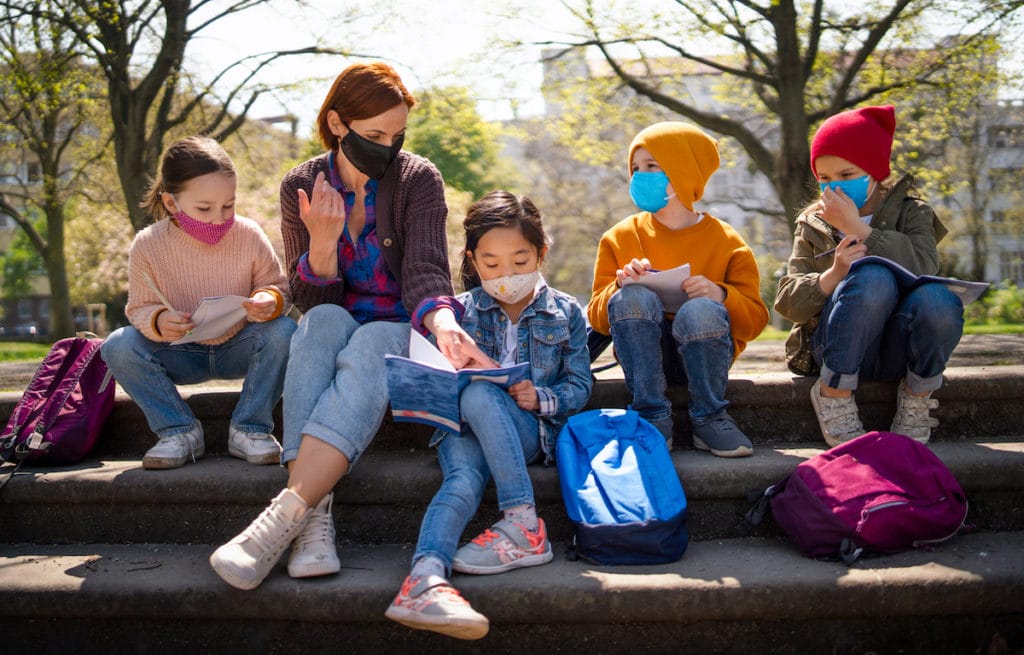
Parents of students with food allergies are concerned about how COVID-19 protocols may affect the accommodations their children need as schools prepare to reopen with in-person learning.
School health and legal professionals emphasize, in turn, that families and students with food allergies need to get back in the mindset of communicating about their needs for purposes of school planning and providing accommodations.
In 2020, both the Centers for Disease Control and later the U.S. Department of Education issued guidelines for schools to provide in-person learning safely during the pandemic. Among the recommendations were eating lunches (or snacks) in the classroom to avoid, as the CDC put it, having students “mixing in common areas”. As Allergic Living previously reported, the change in guidance regarding food in the classroom and other learning spaces raised concerns for food allergy advocates and parents, due to allergen exposure risks.
For the 2021-22 academic term, however, the CDC no longer explicitly recommends keeping food within the classroom. Instead, the federal agency is leaving it to states and individual schools to decide whether meals are eaten and distributed in the cafeteria or in the classroom. For food allergy parents, it’s important to find out: What will the protocol be in your child’s school?
Allergens and the Class
Dr. Alice Hoyt is among those concerned that measures for COVID-19 safety moved to an acceptance of food in the learning space. “We made so much progress on prohibiting food in the classroom, and in a blink of an eye it was gone,” says the Associate Staff Physician and allergist at Cleveland Clinic.
“Food in the classroom is inherently problematic,” she says. For all children, she views food as a distraction in the learning space. But with a food allergy, she says a student’s anxiety related to perceived allergen risks in his class can be profound. “For a kid whose had a severe reaction to peanuts, smelling peanut butter can bring on PTSD. Why put that on a child when they are supposed to be in a safe space to learn?”
Hoyt hopes most cafeterias will be open. “I’m not sure why kids can’t eat in a cafeteria if they can go to school.” She stresses the importance of parents’ communication and building school-wide plans that keep allergens out of the classroom.
As most schools move from six feet of distance between student desks to three feet, and many assigning seats, where your child sits in a classroom, and their proximity to the food of other students, is also a topic you should cover in your conversations.
If food is served in the classroom, the better news is that the CDC emphasizes cleaning protocols. However, since the overriding concern is COVID-19 safety, disinfectant and germicidal wipes are often used. Recognizing that these do not remove allergens, parents should discuss with the school about also cleaning surfaces that are used to serve/eat food with soap (detergent).
Kids Rusty on Allergy Rules
School nurses are expressing readiness to manage the return of more students in the fall, while acknowledging that the details of food allergy planning and the needs of each child matter. “Although school nurses were overwhelmed this year with COVID-related duties, they certainly didn’t neglect the medical conditions and duties that they are tasked to do every year,” says Linda Mendonca, president of the National Association of School Nurses. “We continue to advocate for routine education about food allergies and epinephrine auto-injectors.”
Families who have not been dealing with in-person learning for over a year must remind themselves of the steps needed to prepare for the school year. “I’m not concerned about how I’m going to handle allergies,” says Debra Kauffman, a veteran school nurse in Harford, Maryland, who has been recognized for her work on food allergies.”But it is critical that parents talk to their school nurses, and other personnel who work on student accommodations, early. Do it now.”
Kauffman cautions all families with food allergies to be mindful that many students have been home for a year and a half. This means families haven’t had to think about accommodations, communal eating or accidental exposure. “Students have to be reminded not to share food. Parents and students need to look at food labels.”
“Remember, you and your kiddo may be out of practice,” she says.
“Anytime there is a change in your routine, you are at risk for a reaction to happen,“ says Susan Kelly, a nurse and food allergy support group leader in Lynbrook, New York. “It’s really important to communicate early with the school, about your child, what your child’s needs are to stay safe in the school year. Go in and speak for your child. Find your allies.”
Kelly reminds that discussion should involve which auto-injector your child uses, whether your child self-carries the devices, or where they will be stored for easy access. “Because things have been interrupted, we can’t assume that teachers and administrators have held in mind what the appropriate steps are,” says Kelly.
COVID-19 and Cleaning
Some medical professionals see silver linings to some coronavirus-related protocols. “No more parties (with food), more emphasis on handwashing. We’ve learned about the spread of diseases,” says Kelly.
Kauffman notes: “There is more time given to handwashing with soap and water.” At her school, they clean the surfaces where students with food allergies have eaten with soap and water. “Students clean only their own eating area. We also assign seating [for contact tracing purposes] and can organize it by which students have food allergies.” That way, “teachers can keep a special eye on them.”
Parents should be aware that the CDC also recently revised its position on mask wearing in schools, with the aim of preventing the respiratory spread of variants of the COVID-19 virus. Its new guidance is that all students should wear masks indoors regardless of vaccination status.
As well, the CDC continues to encourage classroom ventilation to stem virus spread, and in July the Department of Education issued resources to educate schools that funds from the American Rescue Plan can be used to improve schools’ air quality. The CDC’s guidance does note that caution needs to be used if open windows would lead to exposures that could trigger asthma in a student.
COVID-19 and 504 Plan Rights
While school nurses express confidence that their colleagues around the United States can ably manage multiple health priorities, roughly 50 percent of schools don’t have full-time nurses. Instead, health-care decisions are left in the hands of administrators who have to address competing interests and needs. But this should not deter parents from raising the accommodations they seek for their child.

“There has been a clear directive from the Office of Civil Rights [of the US Department of Education] that schools must continue to provide accommodations to students just as they did prior to COVID-19,” says attorney Tess O’Brien-Heinzen, a partner at Boardman Clark in Madison, Wisconsin, who specializes in education and disability law.“The development of a plan to accommodate your child at school is required under section 504″ of the Rehabilitation Act of 1973. The attorney says the school has an obligation to provide what’s known as a ‘free and appropriate public education’ (FAPE) “that is safe and accommodates the child’s disability,” in this case, food allergy.
“Even if the facts change [with the pandemic], the process should be the same,” says O’Brien-Heinzen. She says families should start asking their 504 teams to reconvene as soon as possible, and have recommendations from your child’s doctor as to what your child needs to be at school safely.
When it comes to food allergy as legally defined disability, “there isn’t a checklist of what schools do and do not have to do,” says O’Brien-Heinzen. “A parent may ask for a specific way to accommodate, but if district believes it can be handled another way with the same result, then they don’t have to accept a parent’s recommendation.” Yet, she says, there has to be a good reason behind that. “In the event that access is denied, there is a formal process to lodge a complaint,” says O’Brien-Heinzen.
All of the experts agree that given the significant work schools are doing to provide social distancing and other mitigation strategies, parents need to begin dialogue about their child’s safety and inclusion as soon as possible.
Jen Jobrack is the an expert on food allergy education and policy, and the founder of Food Allergy Pros.
Related Reading
Free Educational Posters for Food Allergy Awareness
Food Allergies and School: The Issues at Different Ages





